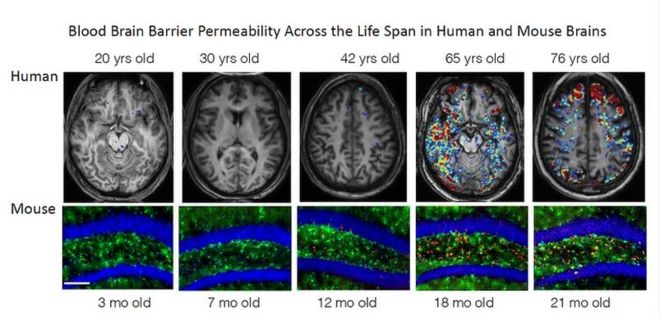Chemicals 'repair damaged neurons in mice' http://www.bbc.co.uk/news/science-environment-47234787
2 studies on mice
First is on leaky brain barrier and inflammation
2 studies on mice
First is on leaky brain barrier and inflammation
One team, from the University of California, Berkeley, showed MRI scans which indicated that mental decline may be caused by molecules leaking into the brain.
Blood vessels in the brain are different from those in other parts of the body. They protect the organ by allowing only nutrients, oxygen and some drugs to flow through into the brain, but block larger, potentially damaging molecules. This is known as the blood-brain barrier.
The scans revealed that this barrier becomes increasingly leaky as we get older. For example, 30-40% of people in their 40s have some disruption to their blood-brain barrier, compared with 60% of 60-year-olds.
The scans also showed that the brain was inflamed in the leaky areas.
Image copyrightAAAS
Image captionThe coloured areas show brain inflammation
Prof Daniela Kaufer, who leads the Berkeley group, said that young mice altered to have leaky blood-brain barriers showed many signs of aging. She discovered a chemical that stops the damage to the barrier from causing inflammation to the brain.
Prof Kaufer told BBC News that not only did the chemical stop the genetically altered young mice from showing signs of aging, it reversed the signs of aging in older mice.
"When you think of brain aging you think about the degeneration of cells and losing what we have," she said.
"What these results show is that you are not losing anything. The cells are still there and they just needed to be 'unmasked' by reducing the inflammation."
Last edited:
